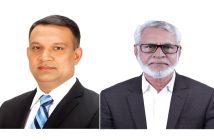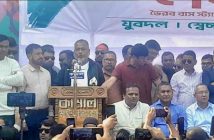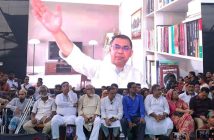 Sheikh Mujib was born on 17 March 1920 in a middle class family at Tungipara in Gopalganj district. Standing 5 feet 11 inches, he was taller than the average Bengalee. Nothing pleased him more than being close to the masses, knowing their joys and sorrows and being part of their travails and triumphs. He spoke their soft language but in articulating their sentiments his voice was powerful and resonant. He had not been educated abroad, nor did he learn the art of hiding feelings behind sophistry; yet he was loved as much by the urban educated as the common masses of the villages. He inspired the intelligentsia and the working class alike. He did not, however, climb to leadership overnight.
Sheikh Mujib was born on 17 March 1920 in a middle class family at Tungipara in Gopalganj district. Standing 5 feet 11 inches, he was taller than the average Bengalee. Nothing pleased him more than being close to the masses, knowing their joys and sorrows and being part of their travails and triumphs. He spoke their soft language but in articulating their sentiments his voice was powerful and resonant. He had not been educated abroad, nor did he learn the art of hiding feelings behind sophistry; yet he was loved as much by the urban educated as the common masses of the villages. He inspired the intelligentsia and the working class alike. He did not, however, climb to leadership overnight.
This history goes back a thousand years. Which is why contemporary history has recognized him as the greatest Bengali of the past thousand years. The future will call him the superman of eternal time. And he will live, in luminosity reminiscent of a bright star, in historical legends. He will show the path to the Bengali nation his dreams are the basis of the existence of the nation. A remembrance of him is the culture and society that Bengalis have sketched for themselves. His possibilities, the promises thrown forth by him, are the fountain-spring of the civilized existence of the Bengalis. The leader of the British humanist movement, the late Lord Fenner Brockway once remarked, “In a sense, Sheikh Mujib is a great leader than George Washington, Mahatma Gandhi and De Valera.” The greatest journalist of the new Egypt, Hasnein Heikal (former editor of Al Ahram and close associate of the late President Nasser) has said, “Nasser is not simply of Egypt. Arab world. His Arab nationalism is the message of freedom for the Arab people. In similar fashion, Sheikh Mujibur Rahman does not belong to Bangladesh alone. He is the harbinger of freedom for all Bangalis. His Bengali nationalism is the new emergence of Bengali civilization and culture. Mujib is the hero of the Bengalis, inn the past and in the times that are.Embracing Bangabandhu at the Algiers Non – Aligned Summit in 1973, Cuba’s Fidel Castro noted, “I have not seen the Himalayas. But I have seen Sheikh Mujib.
In 1954 Sheikh Mujib was elected a member of the then East Pakistan Assembly. He joined A K Fazlul Huq’s United Front government as the youngest minister. The ruling clique of Pakistan soon dissolved this government and Shiekh Mujib was once again thrown into prison. In 1955 he was elected a member of the Pakistan Constituent Assembly and was again made a minister when the Awami League formed the provincial government in 1956. Soon after General Ayub Khan staged a military coup in Pakistan in 1958, Sheikh Mujib was arrested once again and a number of cases were instituted against him. He was released after 14 months in prison but was re-arrested in February 1962. In fact, he spent the best part of his youth behind the prison bars.
Supreme Test: March 7, 1971 was a day of supreme test in his life. Nearly two million freedom loving people assembled at the Ramna Race Course Maidan, later renamed Suhrawardy Uddyan, on that day to hear their leader’s command for the battle for liberation. The Pakistani military junta was also waiting to trap him and to shoot down the people on the plea of suppressing a revolt against the state. Sheikh Mujib spoke in a thundering voice but in a masterly well-calculated restrained language. His historic declaration in the meeting was: “Our struggle this time is for freedom. Our struggle this time is for independence.” To deny the Pakistani military an excuse for a crackdown, he took care to put forward proposals for a solution of the crisis in a constitutional way and kept the door open for negotiations.
The crackdown, however, did come on March 25 when the junta arrested Sheikh Mujib for the last time and whisked him away to West Pakistan for confinement for the entire duration of the liberation war. In the name of suppressing a rebellion the Pakistani military let loose hell on the unarmed civilians throughout Bangladesh and perpetrated a genocide killing no less than three million men, women and children, raping women in hundreds of thousands and destroying property worth billions of taka. Before their ignominious defeat and surrender they, with the help of their local collaborators, killed a large number of intellectuals, university professors, writers, doctors, journalists, engineers and eminent persons of other professions. In pursuing a scorch-earth policy they virtually destroyed the whole of the country’s infrastructure. But they could not destroy the indomitable spirit of the freedom fighters nor could they silence the thundering voice of the leader. Tape recordings of Bangabandhu Sheikh Mujib’s 7th March speech kept on inspiring his followers throughout the war.
Return and Reconstruction: Forced by international pressure and the imperatives of its own domestic predicament, Pakistan was obliged to release Sheikh Mujib from its jail soon after the liberation of Bangladesh and on 10 January 1972 the great leader returned to his beloved land and his admiring nation.
But as he saw the plight of the country his heart bled and he knew that there would be no moment of rest for him. Almost the entire nation including about ten million people returning from their refuge in India had to be rehabilitated, the shattered economy needed to be put back on the rail, the infrastructure had to be rebuilt, millions had to be saved from starvation and law and order had to be restored. Simultaneously, a new constitution had to be framed, a new parliament had to be elected and democratic institutions had to be put in place. Any ordinary mortal would break down under the pressure of such formidable tasks that needed to be addressed on top priority basis. Although simple at heart, Sheikh Mujib was a man of cool nerves and of great strength of mind. Under his charismatic leadership the country soon began moving on to the road to progress and the people found their long-cherished hopes and aspirations being gradually realized.



